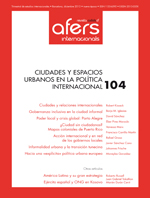Transformar políticas de informalidad urbana: el caso de la transición tunecina
Paraules clau:
sector informal, desarrollo, ciudad, gobernanza, TúnezResum
Revista CIDOB d’Afers Internacionals, nº 104
Cuatrimestral (septiembre-diciembre 2013)
ISSN:1133-6595 | E-ISSN:2013-035X
Este artículo se ocupa del estudio del «sector informal» o «economía informal» en el discurso sobre desarrollo. La pregunta es: ¿hasta qué punto y por qué la estructura de la economía informal, su predominio en áreas urbanas y su vinculación con sectores marginados de la sociedad justifican la afirmación de que el levantamiento tunecino de 2010-2011 puede considerarse una «revolución informal»? Incorporando debates de la sociología y antropología urbanas, el artículo explora la relación entre la informalidad y la vida cotidiana en las ciudades, conectando el impacto de la globalización, las políticas neoliberales y la gobernanza urbana con las actividades económicas informales de los ciudadanos de áreas urbanas marginadas y segregadas espacialmente. El argumento se ilustra con un estudio de caso del levantamiento tunecino de 2010-2011 que pone de manifiesto el cambiante papel de la informalidad y su influencia sobre la gobernanza urbana de la economía informal, en particular sobre el comercio informal.
Referències
Abu Lughod, Janet L. Urban Apartheid in Morocco. Princeton: Princeton University Press, 1980.
Allal, Amin. «Révoltes des marges et des marginalisés». 2011 (en línea) [Fecha de consulta: 06.06.2012] http://thalasolidaire.over-blog.com/article-des-margeset-des-marginalises-en-tunisie-partie-i-11-04-2011-71453612.html
Amin, Ash. «Post-Fordism: Models, Fantasies and Phantoms of Transition», en: Amin, Ash (ed.). Post-Fordism. A Reader. Oxford: Blackwell, 1997, p.1-39.
Ayeb, Habib. «Social and Political Geography of the Tunisian Revolution: The Alfa Grass Revolution». Review of African Political Economy, vol. 38, n.º 129 (2011), p. 467–79.
Bayat, Asef. Life as Politics: How Ordinary People Change the Middle East. Stanford: Stanford University Press, 2010.
– «Slums, Informality, and Politics. An interview with Professor Asef Bayat». DevIssues, vol. 2, n.º 2 (octubre 2007) (en línea) [Fecha de consulta: 06.03.2012] http://www.iss.nl/fileadmin/ASSETS/iss/Documents/DevISSues/DevISSues_Volume_9__number_2__Oct_2007.pdf
Ben Amor, Ridha. Les formes élémentaires du lien social en Tunisie. París: L’Harmattan, 2011.
Ben Mahmoud, Mounir. «Le marché parallèle se légalise davantage». Bussiness News, (05.04.2011). (en línea) http://www.businessnews.com.tn/details_article.php?temp=1&t=519&a=24204
Ben Salem, D. «Un pas vers l’organisation du marché parallèle». LaPresse, (21.11.2011). (en línea) http://www.lapresse.tn/19022013/40676/un-pas-vers-lorganisation-du-marcheparallele.html
Ben Zakour, Abderrahman y Kria, Farouk. Le secteur informel en Tunisie: cadre réglementaire et pratique courante. París: OECD, 1992.
Benarous, Mondher. «Le secteur informel en Tunisie: répression ou organisation?». Programme des XIIèmes journées d’étude du GRATICE, Junio 1998 (en línea) [Fecha de consulta: 20.06.2012] http://www.etf.europa.eu/eventsmgmt.nsf/%28getAttachment%29/981A69F908FA8432C12572F9004EF86E/$File/Tunisia-+Informal+sector.pdf
Brenner, Neil. «The Urban Question as a Scale Question: Reflections on Henri Lefebvre, Urban Theory and the Politics of Scale». International Journal of Urban and Regional Research, vol. 24, n.º 2 (2000), p. 361-78.
Brenner, Neil y Theodore, Nik. «Neoliberalism and the Urban Condition». City, vol. 9, n.º 1 (2005), p. 101-107.
Castells, Manuel. «Urban Sociology in the Twenty-First Century». Cidades – Communidades e Territórios, n.º 5 (2002), p. 9-19.
– The Informational City. Oxford: Blackwell, 1989. Castells, Manuel y Portes, Alejandro. «World Underneath: The Origins, Dynamics, and Effects of the Informal Economy», en: Portes, Alejandro et al. (eds.). The Informal Economy, Studies in Advanced and Less Developed Countries. Londres: John Hopkins University Press, 1989, p. 11-37.
Charmes, Jacques. «Le secteur non structuré en Tunisie: son importance, ses charactéristiques et ses possibilités de promotion». Cah O.R.S.T.O.M, vol. 19, n.º 1 (1983), p. 107-117.
– «Une recherche en cours: L’enquête sur le secteur non structuré en Tunisie». Cah. O.R.S.T.O.M, vol. 15, n.º 3 (1978), p. 261-280.
Chen, Martha Alter. «The Informal Economy: Definitions, Theories and Policies». WIEGO working Paper, n.º 1 (agosto 2012). (en línea) [Fecha de consulta: 22.12.2012] http://wiego.org/sites/wiego.org/files/publications/files/Chen_WIEGO_WP1.pdf
Policies». WIEGO working Paper, n.º 1 (agosto 2012). (en línea) [Fecha de consulta: 22.12.2012] http://wiego.org/sites/wiego.org/files/publications/files/Chen_WIEGO_WP1.pdf
De Certeau, Michel. Kunst des Handelns. Berlín: Merve-Verl., 1988.
De Soto, Hernando. «Les causes économiques cachées du printemps arabe». La Presse, (14.12.2012). (en línea) http://www.lapresse.tn/07022013/59598/lescauses-economiques-cachees-du-printemps-arabe.html
– «The Real Mohamed Bouazizi». Foreign Policy, (16.12.2011). (en línea) [Fecha de consulta: 15.11.2012] http://www.foreignpolicy.com/articles/2011/12/16/the_real_mohamed_bouazizi
– The Other Path. The Invisible Revolution in the Third World. Nueva York: Harper y Row, 1989.
Destremeau, Blandine. «La protection sociale en Tunisie. Nature et cohérence de l’intervention publique», en: Catusse, Myriam et al. (eds.). L’Etat face aux débordements du social au Maghreb: formation, travail et protection sociale. París: Karthala, 2009, pp. 129- 169.
Elwert, Georg et al. «Die Suche nach Sicherheit: Kombinierte Produktionsformen im sogenannten Informellen Sektor». Zeitschrift für Soziologie, n.º 4 (1983), p. 281-96.
Engel, Ulf y Middell, Matthias. «Bruchzonen der Globalisierung, globale Krisen und Territorialitätsregimes – Kategorien einer Globalgeschichtsschreibung». Comparativ, vol. 15, n.º 5/6 (2005), p. 5-38.
Escobar, Arturo. Encountering Development. The Making and Unmaking of the Third World. Princeton: Princeton University Press, 1995.
Evers, Hans-Dieter. «Schattenwirtschaft, Subsistenzproduktion und informeller Sektor. Wirtschaftliches Handeln jenseits von Markt und Staat», en: Heinemann, Klaus (ed.). Soziologie des wirtschaftlichen Handelns. Opladen: Westdeutscher Verlag, 1987, p. 353-66.
Gertel, Jörg. «Informeller Sektor: zur Erklärungsreichweite des umstrittenen Konzepts». Geographische Rundschau, vol. 51, n.º 12 (1999), p. 705-11.
Ghannam, Farha. «Keeping Him Connected: Globalization and the Production of Locality in Cairo», en: Singerman, Diane (ed.). Cairo Cosmopolitan. Politics, Culture and Urban Space in the New Globalized Middle East. Cairo: American University of Cairo Press, 2006, p. 251-66.
Goldstein, Eric. «A Middle-Class Revolution». Foreign Policy, (18.1.2011). (en línea) [Fecha de consulta: 08.12.2011] http://www.foreignpolicy.com/articles/2011/01/18/a_middle_class_revolution
Hafaïedh, Abdelwahab. «Trajectoires de chômeurs diplômés en Tunisie», en: Geisser, Vincent (ed.). Diplômés maghrébins d’ici et d’ailleurs ; trajectoires sociales et itinéraires migratoires. París: CNRS ed., 2000, p. 122-136.
Halimi, Serge. «Islamistes au pied du mur». Le Monde diplomatique, Marzo 2013.
Hansen, Karen-Tranberg. «Changing Youth Dynamics in Lusaka’s Informal Economy in the Context of Economic Liberalization». African Studies Quarterly, vol. 11, n.º 2/3 (2010). p. 13-27.
Hansen, Karen-Tranberg y Vaa, Mariken (eds.). Reconsidering Informality. Perspectives from Urban Africa. Uppsala: Nordic Africa Institute, 2004.
Hart, Keith. «Income Opportunities and Urban Employment in Ghana». The Journal of Modern African Studies, vol. 11, n.º 1 (1973), p. 61-89.
Harvey, David. A Brief History of Neoliberalism. Oxford: Oxford University Press, 2005.
– «The Right to the City». International Journal of Urban and Regional Research, vol. 27, n.º 4 (2003), p. 939-41
Hibou, Béatrice. The Force of Obedience. The Political Economy of Repression in Tunisia. Cambridge: Polity Press, 2011.
Hibou, Béatrice et al. Tunisia after 14 January and its Social and Political Economy. Copenhague: Euro-Mediterranean Human Rights Network, 2011. (en línea) [Fecha de consulta: 21.2.2012] http://www.euromedrights.org/files.php? force&file=exe_Ra_tunisie_En_150Dpi_847268817.pdf
Honwana, Alcinda. «Youth and the Tunisian Revolution». Social Science Research Council, (2011). . (en línea) [Fecha de consulta: 29.06.2012] http://webarchive.ssrc.org/pdfs/Alcinda_Honwana,_Youth_and_the_Tunisian_Revolution,_September_2011-CPPF_policy%20paper.pdf
International Crisis Group. «Tunisia: Violence and the Salafi Challenge». Middle East/North Africa Report, n.º 137 (febrero 2013). (en línea) [Fecha de consulta: 18.7.2013] http://www.crisisgroup.org/~/media/Files/Middle%20East%20North%20Africa/North%20Africa/Tunisia/137-tunisia-violence-and-thesalafi-challenge
– «Tunisie: relever les défis économiques et sociaux. Rapport Moyen-Orient/Afrique du Nord». International Crisis Group, n.º 124 (junio 2012). (en línea) [Fecha de consulta: 02.07.2012] http://www.crisisgroup.org/~/media/Files/Middle%20East%20North%20Africa/North%20Africa/Tunisia/124-tunisierelever-les-defis-economiques-et-sociaux.ashx
ILO-International Labour Office. Employment, Incomes & Equality. A Strategy for Increasing Productive Employment in Kenya. Ginebra: ILO, 1972.
Kanbur, Ravi. «Conceptualizing Informality: Regulation and Enforcement». Cornell University, 2009. (en línea) [Fecha de consulta: 22.12.2012] http://www.arts.cornell.edu/poverty/kanbur/ConceptualizingInformality.pdf
Laroussi, Houda. «Les jeux de l’institution et du secteur informel: entre légalité et illégalité, appel à communication: L’économie informelle et le travail au noir»., 2010. (en línea) [Fecha de consulta: 22.03.2012] http://www.abhatoo.net.ma/maalama-textuelle/developpement-economique-et-social/developpement-economique/economie-souterraine/activites-productives-illicites/les-jeux-de-l-institution-et-du-secteur-informel-entre-legalite-et-illegalite-appel-acommunication-l-economie-informelle-et-le-travail-au-noir
– Micro-crédit et lien social en Tunisie, La solidarité instituée. París: Karthala, 2009.
Lash, Scott y Urry, John. The End of Organized Capitalism. Madison: University of Wisconsin Press, 1987.
Lefebvre, Henri. «The Right to the City», en: Kofman, Eleonore y Lebas, Elizabeth (eds.). Writings on Cities. Cambridge: Blackwell, 1968 [1996], p¡p. 147-59.
Lindell, Ilda. «Between Exit and Voice: Informality and the Space of Popular Agency». African Studies Quarterly, vol. 11, n.º 2 /3 (2010), p. 1-11.
Meddeb, Hamza. «La Tunisie, pays émergent?». Sociétés politiques comparées, n.º 29 (2010), p. 1-89.
Mitchell, Timothy. Rule of Experts. Egypt, Techno-politics, Modernity. Berkeley: University of California Press, 2002.
Peraldi, Michel. «Informalités, nouvelles perspectives analytiques», en: Denieuil, Pierre-Noël y Madoui, Mohamed (eds.). Les entrepreneurs maghrébins, terrains en développement. París: Karthala, 2011, p. 431-441.
Perry, Guillermo E. et al. «Informality: Exit and Exclusion». World Bank, 2007. (en línea) [Fecha de consulta: 28.1.2012] https://openknowledge.worldbank.org/handle/10986/6730
Roy, Ananya. «Urban Informality. Toward an Epistemology of Planning». Journal of the American Planning Association, vol. 71, n.º 2 (2005), p. 147- 58.
Sadiki, Larbi. «Tunisia: The battle of Sidi Bouzid». Al Jazeera English, (2010). (en línea) [Fecha de consulta: 05.02.2012] http://www.aljazeera.com/indepth/opinion/2010/12/20101227142811755739.html
Sassen, Saskia. The Global City. New York, London, Tokyo. Princeton: Princeton University Press, 1991.
Scott, James. «Everyday Forms of Resistance». The Copenhagen Journal of Asian Studies, vol. 4, n.º 89 (2008a), p. 33-62.
– «Vernaculars Cross-Dressed as Universals: Globalization as North Atlantic Hegemony». Macalester International, n.º 24 (2008b), p. 3-29.
– Weapons of the Weak. Everyday Forms of Peasant Resistance. New Haven: Yale University Press, 1985.
Singerman, Diane. (ed.) Cairo Contested. Governance, Urban Space, and Global Modernity. Cairo: Cairo University Press, 2011.
– Avenues of Participation. Princeton: Princeton University Press, 1995. Singerman, Diane y Amar, Paul (eds.). «Contesting Myths, Critiquing Cosmopolitanism, and Creating the New Cairo School of Urban Studies», en: Singerman, Diane y Amar, Paul (eds.). Cairo Cosmopolitan. Politics, Culture and Urban Space in the New Globalized Middle East. Cairo: American University of Cairo Press, 2006, p. 3-43.
Teivainen, Tivo. «Globalization and Economic Surveillance: The International Monetary Fund as Modern Priest». Passages, vol. 1, n.º 1 (1999), p. 84-116.
UTICA. «L’économie informelle: Comment y remédier?». UTICA, (2013(en línea) [Fecha de consulta: 03.01.2013] http://www.utica.org.tn/website/detail_article.php?art_id=1233
Verdeil, Éric. «Villes arabes en révolution : quelques observations». Métropolitiques, n.º 7 (2011). (en línea) [Fecha de consulta: 23.02.2012] http://www.metropolitiques.eu/Villes-arabes-en-revolution.html
Wacquant, Loïc. «Territorial Stigmatization in the Age of Advanced Marginality». Thesis Eleven, n.º 91 (2007), p. 66-77.
– «The Rise of Advanced Marginality: Notes on its Nature and Implications». Acta Sociologica, n.º 39 (2001), p. 121-139.













